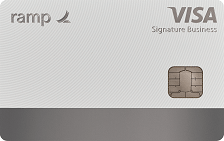Filter Options
×-
-
Unselect all
-
Unselect all
-
Unselect all

Showing 152 Cards
Sort By Column Name:
U.S. Bank Business Altitude™ Power World Elite Mastercard®
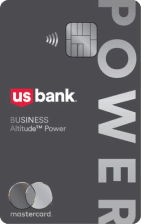
U.S. Bank Business Altitude™ Power World Elite Mastercard®
- 20.24% to 28.24% variable based on creditworthiness and the Prime Rate Regular Purchase APR
- 20.24% to 28.24% variable based on creditworthiness and the Prime Rate Balance Transfer APR
- 29.99% variable based on the Prime Rate Cash Advance APR
At a Glance
The U.S. Bank Business Altitude™ Power World Elite Mastercard® is a business rewards card for that earns up to 2.5X points on eligible purchases with mobile wallets, with no foreign transaction fees and a $0 introductory annual fee.
- Best Benefits
- Rates & Fees
- Why Should You Apply?
- Earn 6X points on on hotels and car rentals booked in the U.S. Bank Rewards Center
- 2.5X points on up to $5,000 in mobile wallet purchases each quarter
- 2X points on all other purchases
- No foreign transaction fees
- Regular Purchase APR: 20.24% to 28.24% variable based on creditworthiness and the Prime Rate
- Balance Transfer APR: 20.24% to 28.24% variable based on creditworthiness and the Prime Rate
- Balance Transfer Transaction Fee: Either 3% of the amount of each transfer or $5 minimum, whichever is greater
- Cash Advance APR: 29.99% variable based on the Prime Rate
- Cash Advance Transaction Fee: Either 5% of the amount of each advance or $10 minimum, whichever is greater
- Penalty APR: 32.49%
- Annual Fee: $195
- Late Payment Penalty Fee: $40
- Return Payment Penalty Fee: $40
- Over Limit Penalty Fee: $40
- Your company spends heavily on mobile wallet purchases
- You plan to issue multiple employee cards to maximize rewards
- You want to streamline your bonus categories
- You spend enough on to justify the annual fee
World of Hyatt Business Credit Card
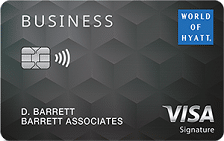
World of Hyatt Business Credit Card
- 20.74% to 27.74% Variable Regular Purchase APR
- 20.74% to 27.74% Variable Balance Transfer APR
- 29.49% Variable Cash Advance APR
At a Glance
The World of Hyatt Business Card is a business hotel rewards credit card from Chase. The card earns up to 9X Hyatt points per dollar spent, offers World of Hyatt Discoverist status for up to 5 employees, and features a lucrative 60,000-point introductory offer – all for a $199 annual fee.
- Best Benefits
- Rates & Fees
- Why Should You Apply?
- Earn 60,000 Bonus Points after you spend $5,000 on purchases in the first 3 months your account is open. Plus, 15,000 more Bonus Points after you spend $12,000 in the first 6 months.
- Up to 9 points total per $1 spent at Hyatt - 4 Bonus Points per $1 on qualifying purchases at Hyatt hotels & up to 5 Base Points per $1 from Hyatt as a World of Hyatt member
- 2 Bonus Points per $1 spent in your top three spend categories each quarter.
- 2 Bonus Points per $1 spent on fitness club and gym memberships
- 1 Bonus Point per $1 spent on all other purchases.
- Up to $100 in Hyatt statement credits - spend $50 or more at any Hyatt property and earn $50 statement credits up to two times each anniversary year.
- 5 Tier-Qualifying night credits toward status and Milestone rewards for every $10,000 you spend in a calendar year.
- World of Hyatt Discoverist status for as long as your account is open. Plus, Discoverist status to up to five employees
- Member FDIC
- Regular Purchase APR: 20.74% to 27.74% Variable
- Balance Transfer APR: 20.74% to 27.74% Variable
- Balance Transfer Transaction Fee: Either $5 or 5% of the amount of each transfer, whichever is greater
- Cash Advance APR: 29.49% Variable
- Cash Advance Transaction Fee: Either $15 or 5% of the amount of each transaction, whichever is greater
- Penalty APR: Up to 29.99% Variable
- Annual Fee: $199
- You have a small business and have employees that travel frequently
- You plan on issuing a handful of employee credit cards
- You expect to spend at least $5,000 on the card within 90 days of opening an account to take advantage of the card’s generous signup offer
Southwest Rapid Rewards Premier Business Credit Card
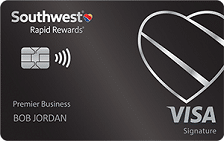
Southwest Rapid Rewards Premier Business Credit Card
- 20.49% to 27.49% variable Regular Purchase APR
- 20.49% to 27.49% variable Balance Transfer APR
- 29.49% variable based on the Prime Rate Cash Advance APR
At a Glance
For frequent Southwest Airlines® flyers, the Southwest Rapid Rewards® Premier Business Credit Card is a business rewards card that offers all the perks of a great travel rewards card while also propelling card members’ businesses forward.
- Best Benefits
- Rates & Fees
- Why Should You Apply?
- Earn 60,000 points after you spend $3,000 on purchases in the first 3 months from account opening and an additional 60,000 points when you spend $15,000 in 9 months.
- 6,000 bonus points after your Cardmember anniversary.
- Earn 3X points on Southwest Airlines® purchases.
- Earn 2X points on Rapid Rewards® hotel and car rental partners.
- Earn 2X points on rideshare.
- 1 point per $1 spent on all other purchases.
- 2 EarlyBird Check-In® each year.
- Member FDIC
- Regular Purchase APR: 20.49% to 27.49% variable
- Balance Transfer APR: 20.49% to 27.49% variable
- Balance Transfer Transaction Fee: Either $5 or 5% of the amount of each transfer, whichever is greater
- Cash Advance APR: 29.49% variable based on the Prime Rate
- Cash Advance Transaction Fee: Either $15 or 5% of the amount of each transaction, whichever is greater
- Penalty APR: Up to 29.99% variable based on the Prime Rate
- Annual Fee: $99
- Late Payment Penalty Fee: $40
- Return Payment Penalty Fee: $40
- You travel often, especially with Southwest Airlines®
- You own or operate a business
- You make frequent in-flight purchases
- You plan on issuing additional cards to your employees
Ink Business Premier® Credit Card
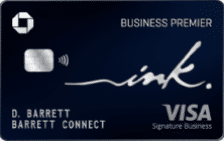
Ink Business Premier® Credit Card
- Flex for Business variable APR: 18.74% to 26.74% Regular Purchase APR
At a Glance
The Chase Ink Business Premier Credit Card is a premium business card that earns up to 2.5% cash back on purchases of $5,000+ and 2% back on all other purchases. The card operates either as pay-in-full, or pay-over-time, thanks to Flex for Business.
- Best Benefits
- Rates & Fees
- Why Should You Apply?
- Earn $1,000 bonus cash back after you spend $10,000 on purchases in the first 3 months from account opening.
- Earn unlimited 2.5% total cash back on purchases of $5,000 or more and unlimited 2% cash back on all other business purchases.
- Travel Benefits: Unlimited 5% total cash back on travel purchased through Chase Travel℠, No Foreign Transaction Fees and Trip Cancellation/Trip Interruption Insurance.
- The only business credit card with 2.5% cash back on every purchase of $5,000 or more.
- Get the buying power you need to make large purchases, cover monthly expenses and help your business grow. While you must pay your Pay In Full balance each month, this card has built-in flexibility. The Flex for Business feature allows for qualifying purchases to be paid over time with interest.
- Purchase with confidence with built-in protections like Fraud Protection, Zero Liability Protection, Purchase Protection, Cell Phone Protection, and Extended Warranty Protection.
- There's no additional cost for employee cards. Monitor spend with digital tools like purchase alerts, set spending limits, reporting, and more.
- Member FDIC
- Regular Purchase APR: Flex for Business variable APR: 18.74% to 26.74%
- Annual Fee: $195
- Late Payment Penalty Fee: $40 or 2% of the Minimum Payment Due, whichever is greater
- You own a medium-sized business with cash reserves
- You make frequent large purchases of $5,000 or more
- You want to earn cash back from your business expenses
- You manage employees who will use their own issued cards
United℠ Business Card

United℠ Business Card
- 20.99% - 27.99% Variable Regular Purchase APR
- 20.99% - 27.99% Variable Balance Transfer APR
- 29.49% Variable Cash Advance APR
At a Glance
Businesses can benefit significantly from airline cards, and the United Business Card from Chase is an excellent example of the breed. The card earns miles on the types of purchases businesses often make, with additional points coming from the United MileagePlus Program.
- Best Benefits
- Rates & Fees
- Why Should You Apply?
- Earn 75,000 bonus miles after you spend $5,000 on purchases in the first 3 months your account is open.
- $0 introductory annual fee for the first year, then $99.
- Receive a 5,000-mile "better together" bonus each anniversary when you have both the United℠ Business Card and a personal Chase United® credit card.
- Earn 2 miles per $1 spent on United® purchases, dining including eligible delivery services, at gas stations, office supply stores, and on local transit and commuting.
- Earn 1 mile per $1 spent on all other purchases. Plus, employee cards at no additional cost - miles earned from their purchases accrue in your account so you can earn rewards faster.
- Enjoy a free first checked bag - a savings of up to $140 per roundtrip (terms apply), 2 United Club℠ one-time passes per year, and priority boarding privileges.
- $100 United® travel credit after 7 United flight purchases of $100 or more each anniversary year.
- Member FDIC
- Regular Purchase APR: 20.99% - 27.99% Variable
- Balance Transfer APR: 20.99% - 27.99% Variable
- Balance Transfer Transaction Fee: Either $5 or 5% of the amount of each transfer, whichever is greater
- Cash Advance APR: 29.49% Variable
- Cash Advance Transaction Fee: Either $15 or 5% of the amount of each transaction, whichever is greater
- Penalty APR: Up to 29.99% Variable
- Annual Fee: $0 intro annual fee for the first year, then $99
- You run small to medium-sized companies
- You plan to issue additional employee cards (at no extra cost)
- You frequently use your credit card to book flights with United or Star Alliance carriers
- You expect to make at least $5,000 in purchases within the first 90 days of becoming a cardholder to earn the card’s signup bonus (for new cardmembers)
You've viewed 5 of 152 credit cards
What Is a Business Credit Card?
A business credit card can be a powerful tool for entrepreneurs looking to separate their personal and business expenses. It is a financial product specifically designed for business owners to manage their business expenses. It works just like a personal credit card but with added features tailored to businesses’ needs.
One of the main advantages of using a business credit card is the ability to keep your personal and business expenses separate, which makes it easier to track and manage your business finances. This separation can also help you when filing your taxes, as you can easily identify and deduct your business expenses.
A business credit card also provides you with a line of credit that you can use to make purchases for your business. This can be especially useful if you need to make large purchases or if you experience cash flow issues. It gives you the flexibility to make necessary purchases and pay them off over time.
Additionally, a business credit card often comes with certain perks and benefits specifically tailored to businesses. These can include rewards programs, cash back rewards, travel rewards, and discounts on business-related expenses. These perks can help you save money and earn valuable rewards as you spend on your business.
What are the Benefits of Business Credit Cards?
Using a business credit card can offer a range of benefits for companies of all sizes. Let’s take a closer look at some of the key advantages:
- Simplified Expense Tracking: With a business credit card, you can easily track and categorize your business expenses. Most business credit cards provide detailed statements, making monitoring your spending simple and identifying areas where you can cut costs.
- Improved Cash Flow Management: A business credit card provides you with a revolving line of credit, allowing you to make purchases even when you are short on cash. This can be particularly helpful during slow business periods or when unexpected expenses arise.
- Separation of Personal and Business Expenses: Separating personal and business expenses is crucial for accurate financial reporting and tax purposes. A business credit card helps you maintain this separation, making it easier to identify and deduct your business expenses during tax season.
- Access to Business-Specific Perks and Rewards: Many business credit cards offer rewards and benefits tailored to businesses’ needs. These can include cashback on business purchases, travel rewards, discounts on office supplies, and more. Taking advantage of these perks can help you save money and earn valuable rewards for your business.
- Building Business Credit: By using a business credit card responsibly and making timely payments, you can build a positive credit history for your business. This can be beneficial when you need to secure financing in the future or negotiate favorable terms with suppliers.
Can Startups Get Business Credit?
Most people assume you need a physical location or an LLC to qualify for a business card. This, however, isn’t true. You do need a registered business, but the qualifications of what a “business” is are surprisingly broad.
If you are a freelancer, sell your goods on eBay or Amazon, or even teach music to local children, you may qualify for a business credit card. If you engage in any work where you earn money—without being an employee for someone else—you probably qualify as having a business.
Because of these loose requirements, business credit cards are a viable option for startups and other non-traditional or established companies.
What to Look for in a Business Credit Card
Rewards Program
Travel business cards are known for their generous bonuses and rewards programs. Even if you don’t own a business that requires frequent travel, you can still apply for a travel business card and enjoy its benefits. By using the card for company expenses, you can earn points or miles that can be redeemed for a well-deserved vacation.
For general travel cards, purchases in select categories, such as flights or restaurants, earn points at a higher rate. Hotel and airline co-branded cards offer additional points for specific categories and purchases directly from the brand.
Other Features to Consider
When choosing a business card, there are other features to look for:
- Free Employee Cards: If you have employees who regularly make company expenses, look for a credit card that allows you to issue additional cards at no extra cost. This is a popular perk offered by many issuers.
- Business Tools: Some issuers provide resources to help you manage your finances more efficiently. These can include integration between your account statement and accounting software, custom expense reports, and alerts for irregular activity.
- Intro APR: If you anticipate carrying a balance on your card, look for one that offers an introductory period with no interest charges. This can be a valuable incentive, especially for larger purchases or multiple small expenses.
How to Apply for a Business Credit Card
Applying for a business credit card is straightforward but requires careful preparation.
Check Your Credit Score
Knowing your credit score before applying for a business credit card is essential. Some issuers require business credit to apply for credit cards, while other banks prefer to use your personal credit score to gauge suitability. The credit card issuer will evaluate your creditworthiness based on this score. If your score is low, take steps to improve it before applying.
Eligibility
Next, you’ll need to determine what type of business you operate. If you are a freelancer, tutor, or operate any other business independently, you will need to apply for a business card as a sole proprietor.
Required Documents and Information
Typically, when applying for a business card as a sole proprietor, there isn’t much more information than you’d expect from a personal credit card application. There are, however, two bits of information to keep an eye out for:
| Info | Explained |
|---|---|
| ① The legal name and contact address of your business | Even if you don’t provide your personal information, you will need to provide all relevant contact information for your business, including the company’s legal name, any names your company is doing business under, and the mailing and phone contact information. |
| ② Basic information about your business | Most banks and lenders want to know some basic facts about your company. These facts include your industry type, the structure of your company and number of employees, and your annual revenue. |
| ③ Tax ID number |
Most business card applications require a tax ID number, which is the number the IRS uses to designate your company when you file your taxes. Many sole proprietorships have no employees – and never plan to hire additional help. Still, business credit card applications often ask for an Employer Identification Number (EIN). An EIN is basically an SSN for a business – it is the same as a tax ID. If you are a freelancer, tutor, run an online shop, or run some other solo venture, chances are you won’t need your EIN or tax ID. The IRS stipulates that an EIN is only necessary for those companies that:
|
| ④ Estimated monthly spend on the card | Lenders want to ensure that your business’ finances aren’t stretched too thin, so expect to answer basic questions about how much you – and your employees – typically place on credit cards each month. |
| ⑤ Personal credit history | If you need to provide a personal guarantee, expect to provide all relevant credit information for the primary account holder. This information includes full legal name, home contact information (phone number, mailing address, e-mail), and your Social Security Number. |
If none of these apply to your side hustle – congratulations – you will only need to provide your personal SSN.
Research and Apply
Look for reputable credit card issuers that offer business credit cards. Research their offerings, interest rates, fees, and rewards programs to find the best fit for your business. Once you’ve chosen a credit card issuer, visit their website and fill out the online application form. Provide accurate information, including your personal details and business information. Double-check the application for any errors before submitting it.
Once your application is approved, you’ll receive your business credit card in the mail. Activate the card according to the issuer’s instructions and use it for your business expenses.
Related Article: How to Use An EIN to Get a Business Credit Card
Tips for Managing Business Credit Card Expenses
Effectively managing your business credit card expenses is crucial for maintaining financial stability and maximizing the benefits of your card. Here are some tips to help you manage your business credit card expenses:
- Create a Budget: Establish a budget for your business expenses and stick to it. This will help you allocate funds to different categories and avoid overspending. Regularly review your budget and adjust as needed.
- Use Expense Tracking Tools: Take advantage of the expense tracking tools your business credit card issuer provides. These tools can help you monitor your spending, categorize expenses, and generate reports for accounting and tax purposes.
- Set Spending Limits: If multiple employees can access your business credit card, consider setting individual spending limits. This will help prevent overspending and ensure that expenses are within budget.
- Pay on Time: Timely payment is crucial for maintaining a good credit history and avoiding late payment fees. Set reminders or automate your payments to ensure that your credit card bills are paid on time.
- Review Statements Regularly: Review your credit card statements regularly to verify the accuracy of charges and identify fraudulent or unauthorized transactions. Report any discrepancies to your credit card issuer immediately.
- Minimize Balance Carrying: Whenever possible, pay off your credit card balance in full each month to avoid accruing interest charges. If carrying a balance is necessary, make a plan to pay it off as soon as possible.
- Keep Personal and Business Expenses Separate: Separating personal and business expenses is essential for accurate financial reporting and tax purposes. To maintain proper separation, avoid using your business credit card for personal expenses.
Tips for Building Business Credit
A business credit card can be a valuable tool for building and improving your business credit. By using your card responsibly and making timely payments, you can establish a positive credit history for your business. Here are some tips for building and improving your business credit with a business credit card:
- Use Your Card Regularly: Make regular purchases with your business credit card and pay off the balance in full each month. This demonstrates that you can responsibly manage credit and make timely payments.
- Monitor Your Credit Utilization: Credit utilization refers to the percentage of your available credit that you are using. To maintain a healthy credit score, aim to keep your credit utilization ratio below 30%. Paying off your balance in full each month can help you achieve this.
- Make Timely Payments: Pay your credit card bills on time to avoid late payment fees and negative impacts on your credit score. Consider setting up automatic payments to ensure that your bills are always paid on time.
- Avoid Maxing Out Your Credit Card: Maxing out your credit card can negatively impact your credit score. Instead, keep your credit card balances well below the credit limit to demonstrate responsible credit usage.
- Regularly Check Your Credit Report: Monitor your business credit report regularly to ensure its accuracy and identify any errors or fraudulent activity. Address any discrepancies promptly by contacting the credit reporting agencies.
- Establish Relationships with Creditors: Building relationships with your creditors can benefit your business credit. Maintain open lines of communication and notify them of any changes or challenges your business may face.
- Be Patient: Building a strong business credit history takes time. Be patient, make responsible credit decisions, and monitor your progress regularly. Over time, you will see improvements in your business credit score.
FAQs
Here are some of the most frequently asked questions concerning business cards:
- You must meet specific criteria to qualify for a business credit card:
- You must operate a for-profit enterprise – even if you haven’t made a profit yet
- If you receive a 1099 tax form from your employer, you qualify as an independent contractor
- You must state your current business income and any anticipated growth
- Yes. While there are no unsecured credit cards for businesses with bad credit, there are secured cards for small businesses. These secured cards require a deposit but offer many of the perks of other top business cards. Unfortunately, the deposit may be a hindrance to many potential applicants.
- Most card issuers require a business to have a good credit score. A good credit score range is anything about 680 on your FICO Score. If your company doesn’t have a credit history or has poor credit, however, considering using your own credit score to improve the chances of getting a business card.
- An EIN is also known as an Employer Identification Number or a tax ID. While you don’t need an EIN to apply for a business credit card, you can use this number. To apply using this tax ID number, you will need to contact specialty business credit bureaus to establish a file. Once established, you can sue the EIN to apply for credit in most cases.
- Yes. Most business credit cards offer significant credit lines to help companies finance significant purchases and improve cash flow. Business card lines of credit can be more than $50,000, with big signup bonuses. Some cash back cards, for example, offer over $50,000 per calendar year in value, but with huge spending requirements – sometimes requiring spending $15,000 within 90 days.
- Yes. American Express offers a business version of both the Platinum Card and the Gold Card. The Business Platinum Card from American Express acts just like any other charge card. This means businesses can spend beyond your credit limit, helping to increase cash flow.
- Rewards are one of the most important things to consider when looking for good business cards. These rewards can be broken down into the following subsections:
- Signup Bonuses: Many cards today provide impressive signup bonuses worth thousands of dollars. Travel business cards, in particular, can be very generous with their introductory bonuses.
- Rewards Programs: Travel rewards business cards involve a rewards or loyalty program that earns points or miles with qualifying purchases. For general travel cards, purchases in select categories – like flights or restaurants – accumulate points at a multiplied rate. Co-branded cards through airlines and hotels will also provide additional points on specific groups, as well as when you make purchases directly with these brands.
- Cash Back: Cashback is the other significant rewards setup found in business cards. Like travel cards, select categories – think office supply stores and telecommunications services – can earn you cash back at an accelerated rate.
- Some of the other factors you should examine when selecting a business card include:
- Additional Employee Cards: Business credit cards offer an efficient way to keep track of company spending, and if you have employees who regularly make company expenses, look for a credit card that allows you to issue additional cards for your staff. Other cards issued at no extra cost is a popular perk, so you’ll find it in multiple offers.
- 0% Intro APR: Another popular feature in business cards is introductory 0% APR periods. You may have plenty of use for your card, be it for multiple small purchases or one big-ticket expense, so paying off a balance over time with no interest charges to worry about is a welcome incentive. These promotional periods range from six months to over 12, so plan your shopping accordingly to maximize your interest-free grace period.
- Business Management Software Tools: Issuers can make it easy to keep track of your money’s movements thanks to resources like the integration between your account statement and accounting software, custom expense reports, and irregular activity alerts.
Conclusion
A business credit card is a valuable tool for businesses (and entrepreneurs) looking to separate their personal and business expenses. It allows for easy tracking and management of business finances, simplifies expense tracking, and improves cash flow management. Business credit cards also offer perks and rewards tailored to businesses, help build business credit, and are accessible to startups and non-traditional businesses.
Editorial Disclosure – The opinions expressed on BestCards.com's reviews, articles, and all other content on or relating to the website are solely those of the content’s author(s). These opinions do not reflect those of any card issuer or financial institution, and editorial content on our site has not been reviewed or approved by these entities unless noted otherwise. Further, BestCards.com lists credit card offers that are frequently updated with information believed to be accurate to the best of our team's knowledge. However, please review the information provided directly by the credit card issuer or related financial institution for full details.



